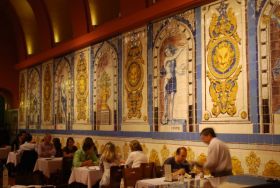How’s the standard of living in Portugal?
Juan Matias - BLUE Boutique Hostel & SUITES
 For most of the civilized countries, Portugal is really, really cheap. The minimum wage salary in Portugal by law is €450 (US $669) so that’s what you get paid if you work at McDonald’s or in a toll shop in the motorway or in a restaurant or something like that. So therefore, properties to rent have to be within budget for people like these; they have to afford an apartment for €200 (US $223). But this is normally in the worst areas a long way out from the city center...
For most of the civilized countries, Portugal is really, really cheap. The minimum wage salary in Portugal by law is €450 (US $669) so that’s what you get paid if you work at McDonald’s or in a toll shop in the motorway or in a restaurant or something like that. So therefore, properties to rent have to be within budget for people like these; they have to afford an apartment for €200 (US $223). But this is normally in the worst areas a long way out from the city center... For most of the civilized countries, Portugal is really, really cheap. The minimum wage salary in Portugal by law is €450 (US $669) so that’s what you get paid if you work at McDonald’s or in a toll shop in the motorway or in a restaurant or something like that. So therefore, properties to rent have to be within budget for people like these; they have to afford an apartment for €200 (US $223). But this is normally in the worst areas a long way out from the city center or the main area.
For most of the civilized countries, Portugal is really, really cheap. The minimum wage salary in Portugal by law is €450 (US $669) so that’s what you get paid if you work at McDonald’s or in a toll shop in the motorway or in a restaurant or something like that. So therefore, properties to rent have to be within budget for people like these; they have to afford an apartment for €200 (US $223). But this is normally in the worst areas a long way out from the city center or the main area.The place where I live, in Cascais (a suburb of Lisbon) is one of the most expensive in Portugal. Cascais is the Beverly Hills of Portugal. To rent a 3-bedroom apartment in a condominium here with a swimming pool and garden and gym and all these infrastructures, will be about €2,000 (US $2,233).
The Portuguese have a few bad habits. One of them is coffee. During the day they go 4 or 5 times for coffee; they interrupt their work to have coffee 6 times. They go to the coffee shop to have an espresso.
In Portugal we don’t drink the coffee with milk. You know those big buckets you drink in America? Here, it’s espresso. The Portuguese are addicted to espresso coffee. Most of them interrupt their work during the day 4 or 5 times or more just to have an espresso, which affects their productivity.
And not only that. Companies normally give you an hour or an hour and a half for lunch, but if you own your business or you have a high position in your company, your lunch will take 2 and a half hours. That is a must. And some Portuguese might even do the siesta after the lunch, which is sleeping for half and hour in the couch. But then, they don’t really leave the office at 5 o’clock. We leave the office at 7, 8 or 9 in the evening. To justify the times you went for coffee and a long lunch meal you had and then after you finish working and you leave at 9 o’clock, you go for a beer and you go for some Portuguese tapas (small plates).
And then you go to the restaurant at 10:30 PM and that’s when you start having your dinner at 10:30. If you’re young, you go out at night, and the nightlife starts very late in Portugal. That’s another bad habit we have. It starts very late. The club or the disco opens at midnight or 1 o’clock and may not close until 7 in the morning the following day. So you actually see a lot of youngsters leaving the clubs at 7 in the morning, putting on a tie, and going straight in the office. Maybe that’s why they need 2 coffees or 5 or 10.
As a culture, we spend a lot of time out of the house, in the outdoors, in the open air places. We love open-air places. All the coffee shops and all the restaurants have tables and chairs to sit outside because the weather is always good. We like to talk, we like to drink, and we like to eat.
(Coffee house in Portugal, pictured.)
Posted April 20, 2016


